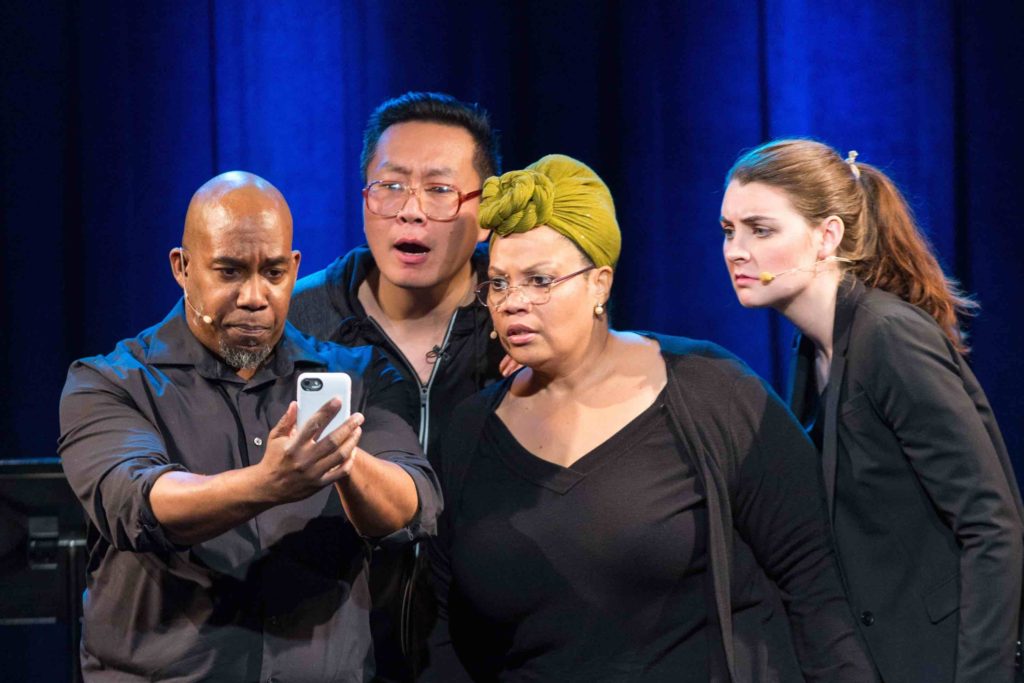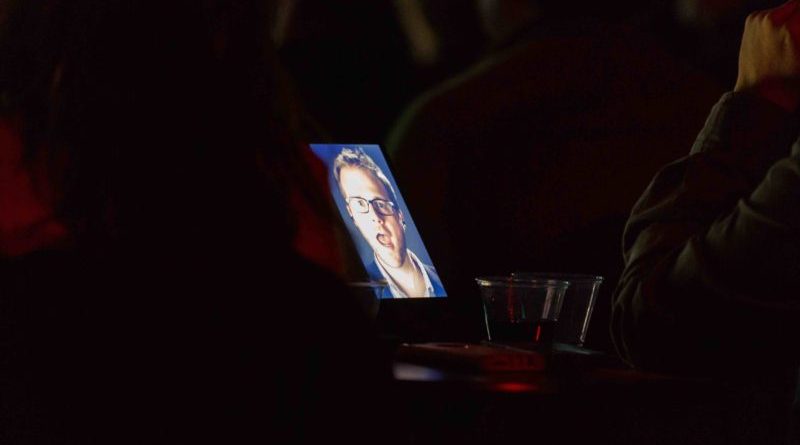INTERVIEW: In new opera ‘Looking at You,’ check your privacy at the door
Photo: Looking at You looks at issues of privacy in the digital age. Photo courtesy of BRIC / Provided by Everyman Agency with permission.
With a premise that’s influenced by today’s saturated marketplace of snooping surveillance techniques and hidden user data — all courtesy of Big Brother and corporate America — Looking at You, a new opera about to receive its world premiere, proves to be a cautionary tale and one that needs a helping hand from audience members.
It’s also a noir-influenced, EDM-inspired hoot. Did we mention the singing tablet computers?
The show, which plays Sept. 6-21 at the HERE Arts Center in New York City, features music by Kamala Sankaram, a libretto by Rob Handel, direction by Kristin Marting and musical direction by Samuel McCoy. HERE co-presents the production with Opera on Tap and Experiments in Opera.
The helping hand from audience members comes in the form of a clever immersive theater technique. Here’s how it goes: Ticket buyers, no doubt unsuspecting, are invited into the corporate headquarters of Rix, a fictional company in Silicon Hills. They have congregated to celebrate the launch of a new app called CheckUOut, and their first action is to be served drinks after giving their orders to a computer-generated assistant. All around them is a swirl of operatic voices and noir elements that set the atmosphere for what’s to come.
Eventually, the songs and accompanying videos become personal, reciting information about the audience members, who have been seemingly tracked from the moment they walked in the door (or even bought a ticket).
The creative team has done their homework on this surveillance piece. They have consulted behavioral economist Alessandro Acquisti and his team at Carnegie Mellon’s Privacy Economics Experiments Laboratory; Ralph Gross, chief scientist for BluPanda; Bandcamp co-founder Joe Holt; Bandcamp head programmer Daniel Dickison; and video designer David Bengali. The collaborations helped the Looking at You team learn how to “mine public data in real time during each performance through a custom-designed system, which at times includes 32 distinct streams of video.”
To explain this unique operatic phenomenon even further, Hollywood Soapbox exchanged emails with Sankaram, who has received commissions from Washington National Opera, Houston Grand Opera, Shakespeare Theatre Comapany, Opera on Tap and the Brooklyn Youth Chorus, among others. Questions and answers have been slightly edited for style.
How would you describe Looking at You to someone who has no idea about the production?
We like to describe it as ‘Edward Snowden meets Casablanca.’ It’s a story of high-tech espionage and star-crossed lovers, with music that borrows equally from EDM, film-noir soundtracks and opera, scored for piano, saxophone trio and electronics, with a chorus of singing tablet computers. On the day that Dorothy gets her dream job, she finds out that her long-lost lover has become the world’s most famous whistleblower. Will she turn him in or burn her shiny life to the ground to save him?
How immersive will the production get?
The show is set in the canteen at Rix, a tech company in the fictional Silicon Hills. Audience members are seated at café tables, where they can interact with tablet computers containing a digital assistant who will help them get drinks. The staging takes place all around the space, so the audience is really inside the show.
It’s not your typical immersive show in that the audience can stay in their seats. They (mostly) don’t have to interact with the actors, and they don’t have to say any lines. But, if they agree, they can become part of the show in a very immediate and unexpected way. I can’t really say much more than that without giving away too much, but I think you won’t have experienced this kind of immersive theater before.

How long has the production been in development?
It’s been in development about five years, which isn’t actually all that long for an opera (!). Part of what has kept the piece in development has been trying to keep up with the pace of change in both the technology and the culture at large.
Rob and I were first inspired to make a piece about privacy and the internet following the Snowden revelations. Shortly after that, Rob (through his position as professor of playwriting at Carnegie Mellon) met Alessandro Acquisti, a privacy expert who studies the exact things we were interested in. I also happened to have taken a job as a research consultant with the Ford Foundation’s Internet Rights unit, so I was reading up on many of the same issues.
So we were deeply engaged in thinking about the impact of tech companies on internet culture and privacy at a time before awareness was as widespread as it is now. When we started, our main concern was how to get people thinking about the fact that their private information was easy to find. But then, of course, the 2016 election happened, Cambridge Analytica happened, and we realized that the issue wasn’t just about privacy and had never really been just about privacy.
The issue is really about who has access to your personal information and how they are being allowed to use it. So basically, we’ve been revising the piece in order to keep up with both the news cycle and the tech, and I’m glad it’s finally premiering before anything else happens!
What was it like working with Carnegie Mellon’s Privacy Economics Experiments Laboratory?
While I have a research background, this is the first time I’ve worked on a piece that has so thoroughly merged academic research with an artistic practice. Alessandro Acquisti and Ralph Gross (who is now with BluPanda) have really helped us to clarify what the final takeaway from the piece should be for the audience and have helped us strategize how we can get there.
I should also mention that in addition to CMU, we are also collaborating with Joe Holt and Daniel Dickison, two engineers from Bandcamp.com, who are building custom software for the piece, so it’s really a collaboration between artists, people working in tech and academic researchers, which is very exciting.
What was it like to collaborate with Rob Handel and Kristin Marting?
This is my second collaboration with both Rob and Kristin, and I’ve also collaborated with both of them separately on other projects. It’s nice to be able to collaborate on more than a single project, since usually it takes making at least one piece together to really get to know each other.
Opera and music-theater are complicated art forms because you have to figure out how to make something that can tell the story in three ways: through the text, through the music and through the staging. Ideally, you want those three things to complement each other rather than getting in each other’s way.
So there’s a lot of compromise, letting go of ego and trust involved. I’m lucky to have collaborators that I trust, and also to know that if I feel strongly about something, they will help me to figure out if and how it fits into the piece. In the end, we’re all working together to create something that we couldn’t have made alone.
What do you think the show says about privacy and online communication in the 21st century?
I think the piece addresses the pressing issues we’re facing in a way that is entertaining, but still thought provoking. One of the questions I’ve been asked about this show is whether ‘privacy’ is an outdated concept. If we’re in the age of personal branding, why should we care who sees what we post or what is done with that data?
My answer to this is that we should care because we don’t really know what is going to be done with the data in the future. We present an extreme version of this scenario in the finale of the show, but the fact is that your data is already being used to make decisions about you that you might not know about. Right now algorithms are widely used for this decision-making, and they ‘learn’ to make decisions based on hidden patterns in the aggregated data of a population.
This means that we don’t really know why these decisions are being made (and in many cases, neither do the people that created the algorithms in the first place), and we have no recourse against them.
What if your insurance premium goes up because you post a picture with a martini? What if you lose your job because your car reported that you were speeding? It seems far-fetched, but people are already losing their jobs or being denied opportunities because an algorithm has made a decision about them that they couldn’t fight. We have the opportunity now to decide what we want the internet to be, but we can only do that if we are aware of what the problems facing us actually are.
By John Soltes / Publisher / John@HollywoodSoapbox.com
Looking at You, featuring music by Kamala Sankaram, will play Sept. 6-21 at HERE in New York City. Click here for more information and tickets.

